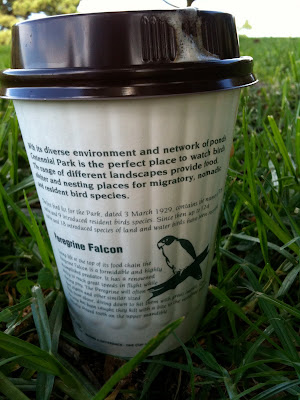I love coffee. I also enjoy a good conversation. And I'm certainly not immune to a spot of conservation.
So you can imagine my delight when I came across these takeaway coffee cups at the newly refurbished café at Centennial Park.

They're a great reminder of the natural environment and the wildlife with whom we share the park, as well as a reassuring piece of communication in a world where all too often cost and convenience erase all signs of character.
Now, if only someone could design a better lid.

